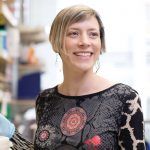Next Gen Lillian Eichner: Reading the clues to fight cancer
Although Eichner isn’t a private investigator, she is on the path to becoming the other type of PI–a principal investigator. She pieces together molecular and genetic clues to reveal how cancer commits its crime. In the research laboratory, she looks for evidence, pursues leads and exhausts dead ends in an attempt to solve “whodunit.”
“Cancer is one of biology’s biggest mysteries; it is still so undefined, and the clues are not all known,” Eichner says. “In a mystery novel, if you can’t see the crime scene, and you don’t know what the weapon was, how can you possibly ask the right questions to find the culprit? The intriguing part about studying lung cancer is following the questions and clues.”
Eichner began studying cancer while pursuing her PhD at McGill University in Montreal. She was drawn to the Salk Institute for her postdoctoral studies because Reuben Shaw, director of the Salk Cancer Center and a professor in Salk’s Molecular and Cell Biology Laboratory, has taken a new approach to cancer by studying the metabolic pathways of deadly tumors. Eichner’s work at Salk focuses on an antitumor protein called LKB1, which is missing in 25 to 30 percent of patients who have lung cancer.
“If we understood the mechanisms of how LKB1 functions, we could find new targets for therapies,” Eichner says. “Unlike many scientific inquiries, this question is a discrete, defined puzzle that we can genetically address. The ability to test hypotheses in living systems points to a clear route for eventual translation into the clinic to help patients.”
Eichner was the first author of a paper in Cell Metabolism, published online this past November, that described the role of another important enzyme involved in lung cancer: AMPK. The Shaw lab has shown that this elusive protein supports tumor growth. In lung cancers, AMPK can supply tumors with the nutrients needed to grow; by blocking AMPK, researchers may be able to stop the growth of advanced tumors.
After completing her postdoctoral studies at Salk, Eichner plans to start her own lab.
“My dream is to inform targeted therapies for cancer,” Eichner says. “If we can understand exactly what goes wrong to cause tumor growth in a lung, then we can design effective therapeutic strategies targeting the molecular pathways that we identify.”
Outside of the lab, Eichner focuses on being a role model for her two daughters, a six-year-old and a ten-month-old. She’s even brought her older daughter to the Shaw lab to gaze through a microscope at lung-tumor cells.
“I hope my daughters grow up to do something they love. Science is not an easy career, but I want them to see that as a woman in science, you can not only be successful but also pursue what you love,” Eichner says. “I want science to be a choice they feel they can confidently consider.”
In the meantime, Eichner continues to piece together clues at her bench in the Shaw lab.
Featured Stories
 Gerald Shadel explores stressed-out mitochondriaInside Salk sat down with Shadel to find out how he became interested in mitochondria, what he is driven by scientifically and what he has learned about aging along the way.
Gerald Shadel explores stressed-out mitochondriaInside Salk sat down with Shadel to find out how he became interested in mitochondria, what he is driven by scientifically and what he has learned about aging along the way. The science of agingWhat we know about longevity so far: Minimizing smoking, obesity and overeating while maximizing exercise and social interactions seem to correspond to longer and healthier lives, but not always. While many factors have been touted as panaceas for extending life–everything from adhering to a Mediterranean diet to regularly imbibing red wine–a “fountain of youth” has remained stubbornly elusive.
The science of agingWhat we know about longevity so far: Minimizing smoking, obesity and overeating while maximizing exercise and social interactions seem to correspond to longer and healthier lives, but not always. While many factors have been touted as panaceas for extending life–everything from adhering to a Mediterranean diet to regularly imbibing red wine–a “fountain of youth” has remained stubbornly elusive. Lillian Eichner: Reading the clues to fight cancerEichner began studying cancer while pursuing her PhD at McGill University in Montreal. She was drawn to the Salk Institute for her postdoctoral studies because Reuben Shaw, director of the Salk Cancer Center and a professor in Salk’s Molecular and Cell Biology Laboratory, has taken a new approach to cancer by studying the metabolic pathways of deadly tumors.
Lillian Eichner: Reading the clues to fight cancerEichner began studying cancer while pursuing her PhD at McGill University in Montreal. She was drawn to the Salk Institute for her postdoctoral studies because Reuben Shaw, director of the Salk Cancer Center and a professor in Salk’s Molecular and Cell Biology Laboratory, has taken a new approach to cancer by studying the metabolic pathways of deadly tumors.



















































